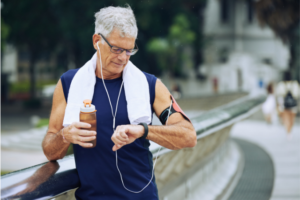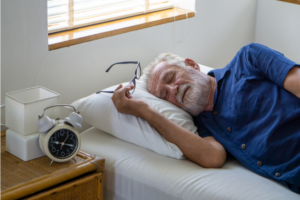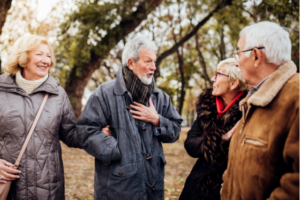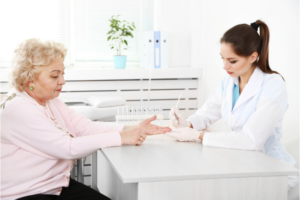Getting older is often associated with diminished abilities and activities, but it doesn’t have to be this way. Today’s seniors are often in better health than previous generations, and they can spend their time participating in activities they have always enjoyed and for longer periods.
Taking care of yourself as you age is a strategy composed of many different actions. Together, these actions can help you to enjoy life regardless of your age. Below are ten tips for healthy aging, as recommended by numerous health experts.
The Top 10 Tips for Healthy Aging
1 – Eat A Healthy Diet

Healthy eating can be a serious issue for older individuals. They may have weight problems that can have a detrimental effect on health. Conversely, some seniors have a diminished appetite. Others may have issues with dentures or swallowing that cause eating problem.
Older individuals often have special dietary restrictions due to high blood pressure, diabetes, or other conditions. Your doctor may recommend meeting with a dietician to learn about the best foods to eat to manage your health problems.
2 – Get Regular Exercise

Some people crave physical activities, while others do not. However, research has found that being physically active, even in little ways, can benefit health.
Taking walks, swimming, or doing gentle yoga poses can help to increase blood circulation, strengthen muscles and bones and improve sleep. Working out with small hand weights can also help keep your bones strong.
If you have physical limitations, you can still find a suitable exercise to help your body stay active. Senior centers, books, and the internet are good places to find gentle exercise ideas for older individuals.
3 – Develop Good Sleeping Habits

A good night’s sleep is critical for a healthy mind and body. Sleep deprivation can cause your immune system to weaken, leading to increased vulnerability to disease and illness.
Inadequate sleep can affect your memory and ability to think clearly and focus. Lack of sleep can also affect your mood, leaving you feeling depressed, irritable, and out of sorts. It can even lead to full-blown panic attacks.
Try to avoid napping during the day, which can throw off your sleep cycle. Refrain from drinking caffeine-containing drinks after 6 p.m., and don’t drink alcohol in the evening. Make sure you get some exercise during the day. If you continue to have problems getting to sleep or staying asleep, talk to your doctor for help.
4 – Drink Plenty of Water

Older people often don’t feel thirsty, and this can lead to dehydration. Because water is critical for your body to function correctly, this chronic state of slight dehydration in older individuals can lead to impaired health, causing dizziness, muscle cramps, and fatigue that they may not recognize as a lack of sufficient water.
Replenishing your fluids throughout the day is even more important for older individuals. Keep a suitable cup of water near you for drinking as you go about your day. If you get tired of drinking plain water, try adding a tiny bit of various fruit juices to flavor it up. You will be helping your brain, muscles, kidneys, and heart work more efficiently.
5 – See Your Doctor Regularly
Regular visits to your primary care physician are an excellent way to keep a close eye on important health issues such as high blood pressure, high cholesterol, diabetes, potential heart problems, and kidney problems.
These visits are an excellent opportunity to catch up on needed tests, ask questions on health matters, and ensure you do everything possible to keep yourself healthy. In addition, regular visits help you establish a rapport with your doctor to understand your health needs better.
6 – Keep Your Immunizations Up to Date

Being older makes you more vulnerable to complications from various diseases. That’s why staying up to date on your immunizations is so critical. Health experts recommend some immunizations for seniors. Your annual flu shot should be one of your must-have immunizations.
Although you may think the flu is a minor illness, it can result in severe complications for individuals over 65. Flu viruses mutate quickly, and vaccines are developed each year to defeat common mutations. That’s why getting your flu shot each year is vital for your health. The pneumococcal vaccine protects you against pneumonia, which kills many seniors each year.
Two different shots are recommended for seniors taken at least 11 months apart to protect them against pneumococcal infections fully. Shingles are the same virus that causes chickenpox. This virus can lie dormant in human tissues for many years.
It’s thought that lowered immune system response in older individuals can trigger the awakening of the virus, which can cause pain and uncomfortable rash. Suppose you’re over 65, your physicians may recommend getting a vaccine to prevent shingles, but they may suggest other vaccines based on your health needs.
7 – Get Out With Friends and Family
 Research on aging finds that interaction with family and social engagement can profoundly impact older people’s physical and mental health. Unfortunately, health and mobility problems sometimes isolate seniors in their own homes, leading to depression and worsening health problems.
Research on aging finds that interaction with family and social engagement can profoundly impact older people’s physical and mental health. Unfortunately, health and mobility problems sometimes isolate seniors in their own homes, leading to depression and worsening health problems.
The reason for this is simple. Socializing and interacting with other people causes your body to produce serotonin and other chemicals stimulating body processes. Even the visual stimulation of being in friends’ company can help your body function better. So, as you age, it’s worth the time and effort to get out and about. It will help you stay younger both physically and mentally.
8 – Minimize Alcohol Consumption and Tobacco Use

Excessive alcohol consumption can undermine seniors’ health, causing cellular changes associated with cancer, brain damage, immune system disorders, and cardiovascular problems. In addition, drinking alcohol can interact with medications that seniors are taking. Alcohol can result in issues with balance, concentration, and memory.
For these reasons, you should limit the amount of alcohol you consume as you age. Tobacco also causes cellular changes, can impair breathing, and should be avoided. Talk to your doctor about a smoking cessation program or one of the available medications to help people stop smoking.
9 – Do Self Care For Minor Aches and Pains
Getting older often means a few more aches and pains than in your younger days. Doing chores around the house or outdoor yard work can lead to muscle or joint pain that affects your mobility.
You can address these minor discomforts with several home remedies. The R.I.C.E strategy can help everyday aches and pains, that is, “rest,” “ice the area,” “use a compression bandage,” and “elevate” the area.
A long soak in your bathtub can help relieve general muscle discomfort and joint pain. You can find many gels and ointments at your local pharmacy to reduce joint or muscle aches.
A massage gun will help work out kinks in muscle and improve circulation to joints experiencing discomfort from daily activities.
Supporting the affected area with an elastic bandage or other types of bracing can be helpful. Talk to your doctor about supplements that can help relieve joint pain associated with arthritis.
10 – Get Your Scheduled Tests

As people age, their risk of developing numerous health problems increases. Your physician may order frequent or annual testing to monitor or detect various diseases in their early stages.
It’s essential to have these tests done as your doctor recommends, ensuring your continued good health and managing any health problems effectively.
People can stay healthier longer and enjoy their favorite activities well into their golden years. But this doesn’t happen by accident. Implementing these tips for healthy aging won’t only extend your life but also increase your satisfaction. The time and attention you give to maintaining your good health will pay off with better mobility, a sharper mind, and improved quality of life.


